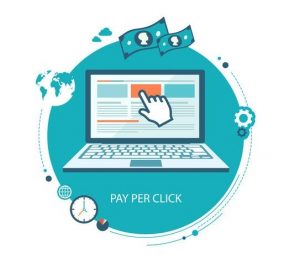If you’ve conducted an online search recently, you’ve been on the consumer end of pay-per-click advertising.
Pay-per-click (or PPC) refers to the sponsored links that show up when you run a search for “high-pigment eye shadow” or “Thai cooking class”. Instead of paying an initial fee to run the ad, companies pay a small amount every time the ad gets clicked.
PPC is an effective way to drive customers to your site, but you’ll want to follow these four tips below for maximum results.
 Find the Right Words
Find the Right Words
Start your PPC campaign with the major search engines: Google, Bing, and Yahoo. The secret to success here is finding the best keywords for optimal click-throughs.
As an advertiser, you’ll bid on the keywords most likely to drive clients to your site. Different keywords come with different costs, so choose wisely to get the most bang for your buck.
Also, consider the impact of using negative keywords. These can streamline your results by kicking out searches that use your keywords in a way that’s not actually relevant to what you offer (for example, if you sell beautiful, handcrafted greeting cards, you don’t want a search for “online greeting cards” to pull up your ad).
Because you’re charged every time your ad is clicked, using negative keywords can save you money.
Pick Your Platform
While search platforms are still the #1 place for PPC ads, there’s an ever-expanding list of other options on social networks. Facebook is certainly the most well-known and far-reaching of these, but, depending on your product and target audience, consider platforms like Pinterest, Instagram, and LinkedIn.
Each one offers a slightly different way to style your ad for maximum reach.
Know Your Audience
It’s not enough to know where your target audience hangs out — it’s also important to know when.
Are they early birds or night owls? Stay-at-home moms sitting down for a relaxing cup of coffee after a hectic morning dropoff? College students up late after a night of studying (or partying)? Know when your audience is online and ready to listen.
Additionally, don’t neglect the power of mobile. More searches are conducted from mobile devices than home computers, so make sure your campaign provides an optimized experience for mobile users.
Don’t Go It Alone
Setting up a successful PPC campaign is one thing, but maintaining it can be a full-time job.
Are there new keywords (or negative keywords) you should be using? Add them in now!
Are some of your most expensive keywords underperforming? Stop wasting money on them! Have you updated your landing pages recently, making sure the content there is well-written and relevant?
What are your competitors up to? Do they know something you don’t?
If you’d rather focus on running your business than running your PPC campaign, hire PPC experts who will know what keywords will convert, who will write copy that gets you a top ranking, and who stays on top of industry trends so you don’t have to.
To Conclude:
PPC is a fantastic tool, but it takes knowledge and experience to get the conversions you’re looking for. Hiring a professional can help you utilize this resource to its fullest potential while leaving you free to concentrate on your own area of expertise — your business.

 Find the Right Words
Find the Right Words